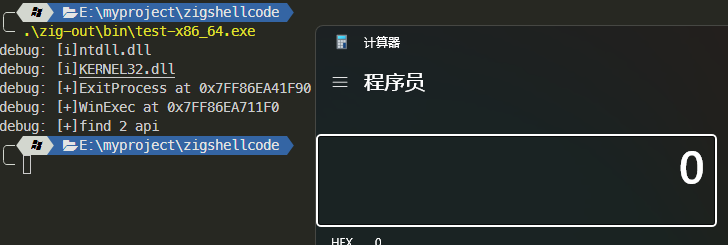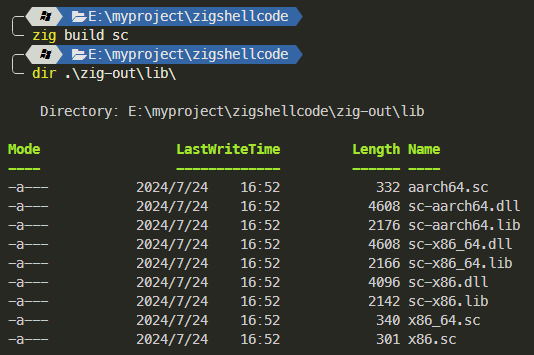1
2
3
4
5
6
7
8
9
10
11
12
13
14
15
16
17
18
19
20
21
22
23
24
25
26
27
28
29
30
31
32
33
34
35
36
37
38
39
40
41
42
43
44
45
46
47
48
49
50
51
52
53
54
55
56
57
58
59
60
61
62
63
64
65
66
67
68
69
70
71
72
73
74
75
76
77
78
79
80
81
82
83
84
85
86
87
88
89
90
91
92
93
94
95
96
97
98
99
100
101
102
103
104
105
106
107
108
109
110
111
112
113
114
115
116
117
118
119
120
121
122
123
124
125
126
127
128
129
130
131
132
133
134
135
136
137
138
139
140
141
142
143
144
145
146
147
148
149
150
151
152
153
154
155
156
157
158
159
160
161
162
163
164
165
166
167
168
169
170
171
172
173
174
175
176
177
178
179
180
181
182
183
184
185
186
187
188
189
190
191
192
193
194
195
196
197
198
199
200
201
202
203
204
205
206
207
208
209
210
211
212
213
214
215
216
217
218
219
220
221
222
223
224
225
226
227
228
229
230
231
232
233
234
235
236
237
| const std = @import("std");
const windows = std.os.windows;
pub const LDR_DATA_TABLE_ENTRY = extern struct {
InLoadOrderLinks: windows.LIST_ENTRY,
InMemoryOrderLinks: windows.LIST_ENTRY,
Reserved2: [2]windows.PVOID,
DllBase: ?windows.PVOID,
EntryPoint: windows.PVOID,
SizeOfImage: windows.ULONG,
FullDllName: windows.UNICODE_STRING,
Reserved4: [8]windows.BYTE,
Reserved5: [3]windows.PVOID,
DUMMYUNIONNAME: extern union {
CheckSum: windows.ULONG,
Reserved6: windows.PVOID,
},
TimeDateStamp: windows.ULONG,
};
pub const IMAGE_DOS_HEADER = extern struct {
e_magic: windows.WORD,
e_cblp: windows.WORD,
e_cp: windows.WORD,
e_crlc: windows.WORD,
e_cparhdr: windows.WORD,
e_minalloc: windows.WORD,
e_maxalloc: windows.WORD,
e_ss: windows.WORD,
e_sp: windows.WORD,
e_csum: windows.WORD,
e_ip: windows.WORD,
e_cs: windows.WORD,
e_lfarlc: windows.WORD,
e_ovno: windows.WORD,
e_res: [4]windows.WORD,
e_oemid: windows.WORD,
e_oeminfo: windows.WORD,
e_res2: [10]windows.WORD,
e_lfanew: windows.LONG,
};
pub const IMAGE_DATA_DIRECTORY = extern struct {
VirtualAddress: windows.DWORD,
Size: windows.DWORD,
};
pub const IMAGE_OPTIONAL_HEADER32 = extern struct {
Magic: windows.WORD,
MajorLinkerVersion: windows.BYTE,
MinorLinkerVersion: windows.BYTE,
SizeOfCode: windows.DWORD,
SizeOfInitializedData: windows.DWORD,
SizeOfUninitializedData: windows.DWORD,
AddressOfEntryPoint: windows.DWORD,
BaseOfCode: windows.DWORD,
BaseOfData: windows.DWORD,
ImageBase: windows.DWORD,
SectionAlignment: windows.DWORD,
FileAlignment: windows.DWORD,
MajorOperatingSystemVersion: windows.WORD,
MinorOperatingSystemVersion: windows.WORD,
MajorImageVersion: windows.WORD,
MinorImageVersion: windows.WORD,
MajorSubsystemVersion: windows.WORD,
MinorSubsystemVersion: windows.WORD,
Win32VersionValue: windows.DWORD,
SizeOfImage: windows.DWORD,
SizeOfHeaders: windows.DWORD,
CheckSum: windows.DWORD,
Subsystem: windows.WORD,
DllCharacteristics: windows.WORD,
SizeOfStackReserve: windows.DWORD,
SizeOfStackCommit: windows.DWORD,
SizeOfHeapReserve: windows.DWORD,
SizeOfHeapCommit: windows.DWORD,
LoaderFlags: windows.DWORD,
NumberOfRvaAndSizes: windows.DWORD,
DataDirectory: [16]IMAGE_DATA_DIRECTORY,
};
pub const IMAGE_OPTIONAL_HEADER64 = extern struct {
Magic: windows.WORD,
MajorLinkerVersion: windows.BYTE,
MinorLinkerVersion: windows.BYTE,
SizeOfCode: windows.DWORD,
SizeOfInitializedData: windows.DWORD,
SizeOfUninitializedData: windows.DWORD,
AddressOfEntryPoint: windows.DWORD,
BaseOfCode: windows.DWORD,
ImageBase: windows.ULONGLONG,
SectionAlignment: windows.DWORD,
FileAlignment: windows.DWORD,
MajorOperatingSystemVersion: windows.WORD,
MinorOperatingSystemVersion: windows.WORD,
MajorImageVersion: windows.WORD,
MinorImageVersion: windows.WORD,
MajorSubsystemVersion: windows.WORD,
MinorSubsystemVersion: windows.WORD,
Win32VersionValue: windows.DWORD,
SizeOfImage: windows.DWORD,
SizeOfHeaders: windows.DWORD,
CheckSum: windows.DWORD,
Subsystem: windows.WORD,
DllCharacteristics: windows.WORD,
SizeOfStackReserve: windows.ULONGLONG,
SizeOfStackCommit: windows.ULONGLONG,
SizeOfHeapReserve: windows.ULONGLONG,
SizeOfHeapCommit: windows.ULONGLONG,
LoaderFlags: windows.DWORD,
NumberOfRvaAndSizes: windows.DWORD,
DataDirectory: [16]IMAGE_DATA_DIRECTORY,
};
pub const IMAGE_FILE_HEADER = extern struct {
Machine: windows.WORD,
NumberOfSections: windows.WORD,
TimeDateStamp: windows.DWORD,
PointerToSymbolTable: windows.DWORD,
NumberOfSymbols: windows.DWORD,
SizeOfOptionalHeader: windows.WORD,
Characteristics: windows.WORD,
};
pub const IMAGE_NT_HEADERS64 = extern struct {
Signature: windows.DWORD,
FileHeader: IMAGE_FILE_HEADER,
OptionalHeader: IMAGE_OPTIONAL_HEADER64,
};
pub const IMAGE_NT_HEADERS32 = extern struct {
Signature: windows.DWORD,
FileHeader: IMAGE_FILE_HEADER,
OptionalHeader: IMAGE_OPTIONAL_HEADER32,
};
pub const IMAGE_OPTIONAL_HEADER = if (@sizeOf(usize) == 4) IMAGE_OPTIONAL_HEADER32 else IMAGE_OPTIONAL_HEADER64;
pub const IMAGE_NT_HEADERS = if (@sizeOf(usize) == 4) IMAGE_NT_HEADERS32 else IMAGE_NT_HEADERS64;
pub const IMAGE_EXPORT_DIRECTORY = extern struct {
Characteristics: windows.DWORD,
TimeDateStamp: windows.DWORD,
MajorVersion: windows.WORD,
MinorVersion: windows.WORD,
Name: windows.DWORD,
Base: windows.DWORD,
NumberOfFunctions: windows.DWORD,
NumberOfNames: windows.DWORD,
AddressOfFunctions: windows.DWORD,
AddressOfNames: windows.DWORD,
AddressOfNameOrdinals: windows.DWORD,
};
pub const IMAGE_DIRECTORY_ENTRY_EXPORT = @as(c_int, 0);
pub const IMAGE_DIRECTORY_ENTRY_IMPORT = @as(c_int, 1);
pub const IMAGE_DIRECTORY_ENTRY_RESOURCE = @as(c_int, 2);
pub const IMAGE_DIRECTORY_ENTRY_EXCEPTION = @as(c_int, 3);
pub const IMAGE_DIRECTORY_ENTRY_SECURITY = @as(c_int, 4);
pub const IMAGE_DIRECTORY_ENTRY_BASERELOC = @as(c_int, 5);
pub const IMAGE_DIRECTORY_ENTRY_DEBUG = @as(c_int, 6);
pub const IMAGE_DIRECTORY_ENTRY_ARCHITECTURE = @as(c_int, 7);
pub const IMAGE_DIRECTORY_ENTRY_GLOBALPTR = @as(c_int, 8);
pub const IMAGE_DIRECTORY_ENTRY_TLS = @as(c_int, 9);
pub const IMAGE_DIRECTORY_ENTRY_LOAD_CONFIG = @as(c_int, 10);
pub const IMAGE_DIRECTORY_ENTRY_BOUND_IMPORT = @as(c_int, 11);
pub const IMAGE_DIRECTORY_ENTRY_IAT = @as(c_int, 12);
pub const IMAGE_DIRECTORY_ENTRY_DELAY_IMPORT = @as(c_int, 13);
pub const IMAGE_DIRECTORY_ENTRY_COM_DESCRIPTOR = @as(c_int, 14);
pub const IMAGE_SECTION_HEADER = extern struct {
Name: [8]windows.UCHAR,
VirtualSize: windows.ULONG,
VirtualAddress: windows.ULONG,
SizeOfRawData: windows.ULONG,
PointerToRawData: windows.ULONG,
PointerToRelocations: windows.ULONG,
PointerToLinenumbers: windows.ULONG,
NumberOfRelocations: windows.USHORT,
NumberOfLinenumbers: windows.USHORT,
Characteristics: windows.ULONG,
};
pub const IMAGE_BASE_RELOCATION = extern struct {
VirtualAddress: windows.DWORD,
SizeOfBlock: windows.DWORD,
};
pub const IMAGE_RELOC = packed struct(u16) {
offset: u12,
typ: u4,
};
pub const IMAGE_REL_BASED_DIR64: u6 = 10;
pub const IMAGE_REL_BASED_HIGHLOW: u6 = 3;
pub const IMAGE_REL_TYPE = if (@sizeOf(usize) == 4) IMAGE_REL_BASED_HIGHLOW else IMAGE_REL_BASED_DIR64;
pub const IMAGE_IMPORT_DESCRIPTOR = extern struct {
OriginalFirstThunk: windows.DWORD,
TimeDateStamp: windows.DWORD,
ForwarderChain: windows.DWORD,
Name: windows.DWORD,
FirstThunk: windows.DWORD,
};
pub const IMAGE_THUNK_DATA64 = extern union {
const Self = @This();
ForwarderString: windows.ULONGLONG,
Function: windows.ULONGLONG,
Ordinal: windows.ULONGLONG,
AddressOfData: windows.ULONGLONG,
pub fn IMAGE_SNAP_BY_ORDINAL(self: *Self) bool {
return (self.Ordinal & 0x8000000000000000) != 0;
}
pub fn IMAGE_ORDINAL(self: *Self) usize {
return self.Ordinal & 0xFFFF;
}
};
pub const IMAGE_THUNK_DATA32 = extern union {
const Self = @This();
ForwarderString: windows.DWORD,
Function: windows.DWORD,
Ordinal: windows.DWORD,
AddressOfData: windows.DWORD,
pub fn IMAGE_SNAP_BY_ORDINAL(self: *Self) bool {
return (self.Ordinal & 0x80000000) != 0;
}
pub fn IMAGE_ORDINAL(self: *Self) usize {
return self.Ordinal & 0xFFFF;
}
};
pub const IMAGE_THUNK_DATA = if (@sizeOf(usize) == 4) IMAGE_THUNK_DATA32 else IMAGE_THUNK_DATA64;
pub const IMAGE_IMPORT_BY_NAME = extern struct {
Hint: windows.WORD,
Name: [1]windows.CHAR,
};
pub const IMAGE_FILE_RELOCS_STRIPPED = 0x0001;
pub const IMAGE_SCN_MEM_EXECUTE = 0x20000000;
pub const IMAGE_SCN_MEM_READ = 0x40000000;
pub const IMAGE_SCN_MEM_WRITE = 0x80000000;
|



